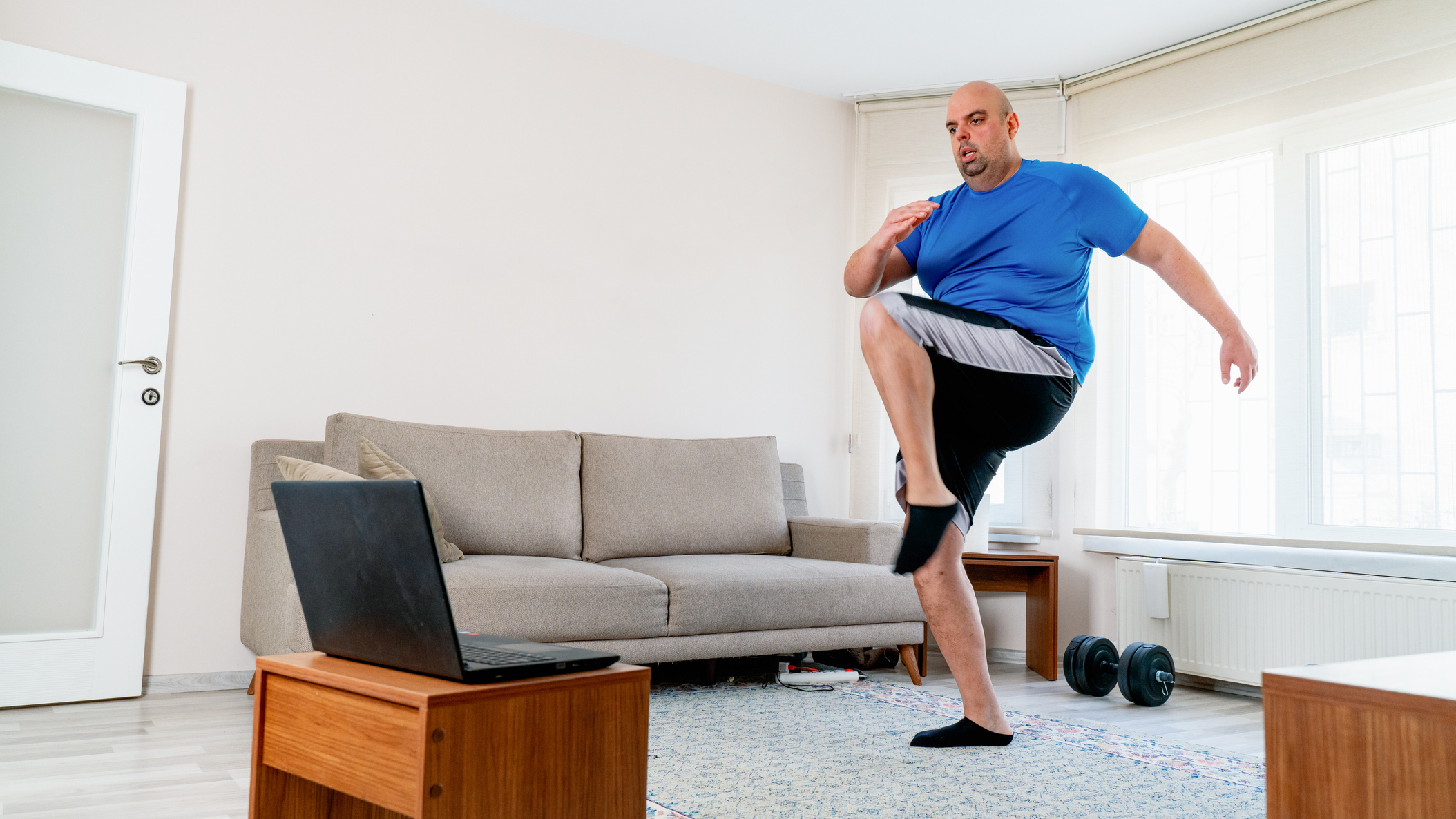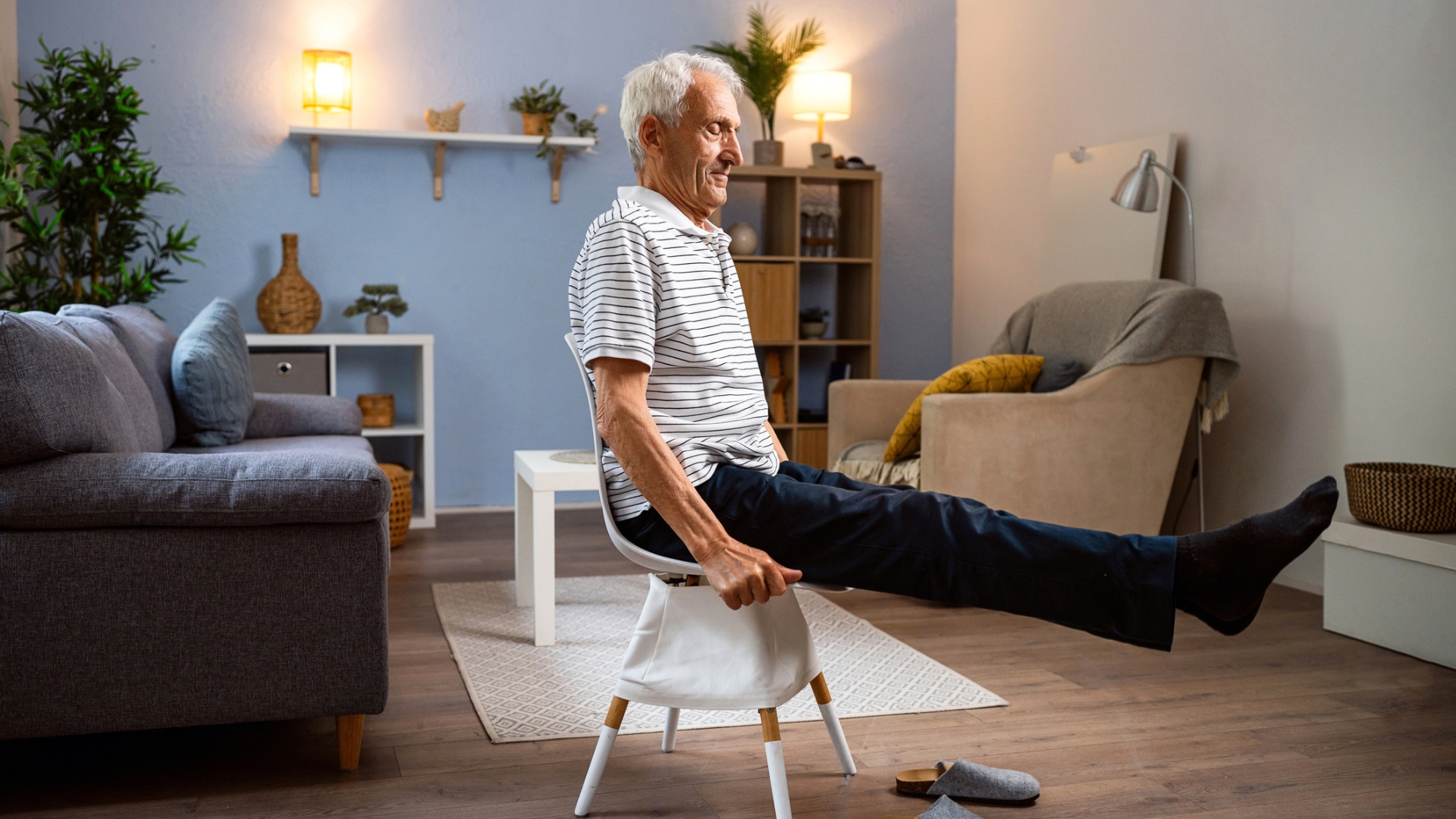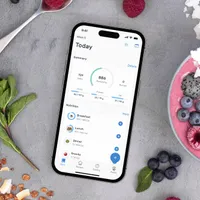You only need seven moves and 30 minutes to boost your metabolism at home
You don't need equipment either to start exercising for weight loss


Safe, sustainable weight loss requires three essential elements: consistent daily movement, a balanced diet and maintaining a calorie deficit.
If you’d like to use your daily movement to also improve your fitness, this beginner-friendly home workout I’ve devised is a great place to start. It requires no equipment and takes less than 30 minutes.
The workout features compound moves, such as squats and lunges, which engage multiple muscle groups simultaneously to maximize calorie burn.
How to do the workout
Spend five minutes warming up, doing dynamic movements to prepare your body for the workout (search the internet and you'll find plenty of options).
The workout uses a circuit format, so perform the first movement for 40 seconds, rest for 20 seconds, then perform the second movement for 40 seconds and rest for a further 20 seconds. Continue in this manner until you've completed every exercise. That's one round. Rest for between one and two minutes, then repeat, completing three rounds in total.
Spend at least five minutes cooling down to gradually lower your heart rate. Adding in some static stretches to reduce muscle soreness and promote recovery (again, there are plenty of great free options available).
The workout in brief
- Squat
- Glute bridge
- Modified shoulder-tap
- Lunge
- Side lunge
- High knees
- Step-in-out burpee
Exercise guides
1. Squat
How to do it:
Start your week with achievable workout ideas, health tips and wellbeing advice in your inbox.
- Start with your feet hip-width apart with toes pointing out slightly
- Bend your knees and push your hips back to lower.
- Pause when your thighs are parallel to the floor, or as low as your mobility allows.
- Push through your heels to return to standing.
Benefits: A squat targets your quads and glutes, and engages your core. It's also one of the best movements you can do for functional mobility.
2. Glute bridge
How to do it:
- Lie on your back with your arms by your sides, knees bent and feet flat on the floor, hip-width apart.
- Push through your heels to slowly lift your hips off the mat until your body is in a straight line from shoulders to knees.
- Pause for a few seconds then lower your hips back to the starting position and relax your glutes.
Benefits: This strengthens the muscles in the back of your body and stretches the hip flexors, which weaken from prolonged sitting.
3. Modified shoulder tap
How to do it:
- Start on your hands and knees, with your arms straight and your hands directly under your shoulders, and your body in a straight line from your head to your knees.
- Engage your core, and keeping your hips still, lift one hand to tap the opposite shoulder, then return the hand to the floor.
- Repeat with the other hand tapping the other shoulder.
- Continue, alternating hands with each rep, keeping your midsection braced and resisting moving your hips and torso.
Benefits: Perform these from the knees to build strength in the shoulders, upper back and core. Progress from your knees to your shoulder taps on your toes as you get stronger.
4. Lunge
How to do it:
- Stand with your feet shoulder-width apart and take a big step forward.
- Bend both knees to lower until both knees are bent to 90° and your rear knee is just above the floor.
- Push through your front foot to return to the starting position.
- Repeat on the other side, alternating sides with each rep.
Benefits: Lunges are great for building strength in the quad, glute and hamstring muscles in your legs, as well as improving balance, stability and coordination.
5. Side lunge
How to do it:
- Stand with your feet hip-width apart and take a big step with your right foot out to the right side.
- Keeping your left leg straight, bend your right knee and push your hips back to lower as far as your mobility allows. Raise your arms to help you balance if you need to.
- Push through your right foot to return to the starting position.
- Repeat on the other side, alternating sides with each rep.
Benefits: The side lunge engages your glutes and inner thighs, and moves the body in a sideways motion, which we rarely do in everyday life.
6. High knees
How to do it:
- Stand with your feet hip-width apart and lift one knee to hip height and raise the opposite arm, bending at the elbow.
- Quickly return to the starting position and repeat on the other side.
- Continue alternating sides at pace.
Benefits: This not only engages your core and leg muscles, it also boosts your cardio and heart health.
7. Step-in-out burpee
How to do it:
- Stand with your feet shoulder-width apart, then bend your knees and fold forward at your hips to place your hands on the floor in front of you.
- Step one foot back at a time until you’re in a high plank position, with your arms straight and your hands directly under your shoulders, and your body in a straight line from your head to your heels.
- Step your feet forward one at a time to meet your hands, then stand up.
- For an extra challenge add a jump at the end.
Benefits: The burpee is a great full-body movement that combines strength and cardio.
The importance of diet for weight loss
While exercise is essential for building strength, boosting metabolism and improving functional mobility, weight loss relies on your body using more calories than you consume, known as maintaining a calorie deficit. In this state, your body uses stored fat as energy, leading to weight loss over time.
Of course, exercise contributes to your daily calorie burn but managing your diet to support this is equally important. After all, no matter how much you exercise, if you consistently consume more calories than you expend, you won’t see the results you’re after.
For healthy weight loss, focus on eating nutrient-dense foods. Prioritize protein to keep you fuller and support muscle repair, alongside vegetables, wholegrains and healthy fats. Avoid processed foods and sugary snacks as these can easily increase your calorie intake without adding much nutritional value.
You can use calorie counting tools like YAZIO to help you monitor your food intake and ensure you’re staying within a calorie deficit. By logging your meals, snacks and exercise you can better understand how much you’re consuming compared to how much you’re burning.
Combine this with a bodyweight workout like the one above at least three times a week. With a balanced diet and consistent calorie tracking you’ll be on your way to building a healthier, more active lifestyle with sustainable, long-term weight loss success.

Yanar Alkayat is a health and fitness editor, registered yoga therapist and level 3 personal trainer. She founded Yanar Mind & Movement alongside her journalism to offer specialist yoga therapy for people living with long-term health conditions, movement disorders and marginalised communities. Her chair yoga classes are funded by Parkinson's UK and she regularly runs yoga and fitness for refugee and asylum seeker groups in London. Formerly a content editor and fitness product testing manager at Women’s Health, Men’s Health and Runner's World, she continues to write for national print and digital media.
-
 Level up your core strength and stability with this five-move medicine ball finisher
Level up your core strength and stability with this five-move medicine ball finisherTry these exercises to improve your core stability and balance
-
 Stretching can be a powerful tool to help the over-60s feel their best—combat aches and pains with these five assisted stretches
Stretching can be a powerful tool to help the over-60s feel their best—combat aches and pains with these five assisted stretchesUse just a chair as your workout buddy for these exercises

